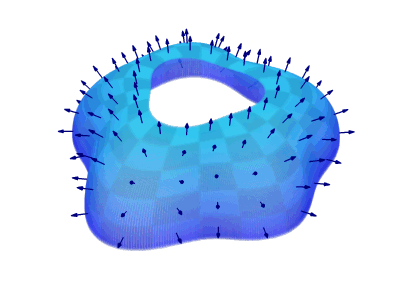Syllabus
PDF form of the syllabus is available in ELC.Course name
Multivariable Calculus MATH 2500.Meeting time
TTh, 12.30pm, Boyd 223. AND TTH, 2.00pm, Boyd 302.The course
Multivariable calculus is a fundamental pillar for many other things:
It extends single variable calculus to higher dimensions. You will see that the structures are much richer than in single variable and that the fundamental theorem of calculus generalizes to higher dimensions.
It provides vocabulary for understanding fundamental processes and phenomena. Examples are planetary motion, economics, waves, heat, finance, epidemiology, quantum mechanics or optimization.
It teaches important background needed in social sciences, life sciences and economics. But it is rigorous enough that it is also suited for students in core sciences like physics, mathematics or computer science.
It builds tools for describing geometrical objects like curves, surfaces, solids and intuition which is needed in other fields like linear algebra or data analysis. Geometry is currently extremely hot: tomography methods in medicine, computer games, google earth, social network analysis all use geometry.
It relates to culture and history. The quest for answering questions like "where do we come from", "what will future bring us", "how can we optimize quantities" all use calculus. They were the motor to develop it. Euler, the inventor graph theory for example knew geometry and calculus well. The history of calculus contains fascinating stories, starting from Archimedes, 2300 years ago up to the modern times, where new branches of multivariable calculus are developed to understand the structure of nature.
It develops problem solving methods. Examples are optimization problems with and without constraints (which is the bread and butter for exconomics), geometric problems, computations with scalar and vector fields, area and volume computations.
It makes you acquainted with a powerful computer algebra system which allows you to see the mathematics from a different perspective. Such systems are more and more needed for visualization, experimentation and to build laboratories for your own research. No programming experience is required however. We will provide templates and get you started with a workshop.
It prepares you for further study in other fields. Not only in mathematics and its applications, but also in seemingly unrelated fields like game theory, probability theory, discrete mathematics, sociology, or number theory, where similar structures and problems appear, even in a discrete setting. Without geometric intuition and paradigms learned in calculus, it is rather hard to work in those fields.
It improves thinking skills, problem solving skills, visualization skills as well as computing skills. You will see the power of logical thinking and deduction and why mathematics is timeless.
Office hours
Office Hours: T 2:30-3:30pm (or by request). Email me if you would like to come.Exams
There are two midterm exams, one take-home assignment, and one final exam.- First midterm: October, 1st
Grades
First and second Midterm (and take-home break assignment) 50 % total Homework 10 % Quizzes 10 % Final 30 % -------------------------------------------------------------------------- Final grade 100 % --------------------------------------------------------------------------

